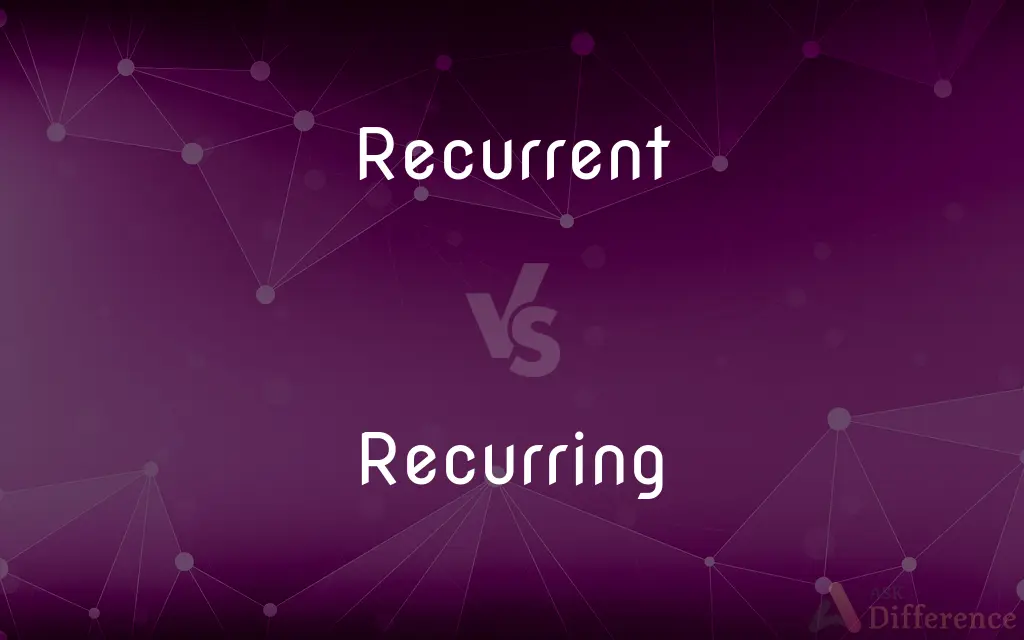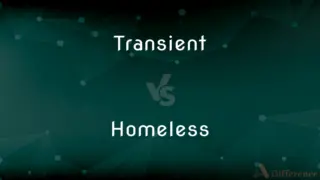Recurrent vs. Recurring — What's the Difference?
By Fiza Rafique & Urooj Arif — Updated on April 3, 2024
Recurrent events happen repeatedly and regularly, following a predictable pattern, while recurring events also repeat but with less regularity and predictability.

Difference Between Recurrent and Recurring
Table of Contents
ADVERTISEMENT
Key Differences
Recurrent events are characterized by their predictability and regular intervals. For example, annual festivals occurring each year on the same date exemplify recurrent events. On the other hand, recurring events happen more than once but lack the regular pattern of recurrent events. For instance, unscheduled power outages may occur several times a year without a predictable pattern.
While recurrent events can often be anticipated and planned for due to their regularity, recurring events might catch individuals or organizations by surprise, requiring more flexible planning and response strategies. This difference highlights the importance of understanding the nature of events to manage them effectively.
In some contexts, the distinction between recurrent and recurring is subtle and depends on the degree of regularity. Recurrent events are expected to happen in a fixed or predictable manner, making them easier to include in long-term planning. In contrast, recurring events, though they happen repeatedly, do not follow a strict timetable, making their anticipation more challenging.
The terminology is often used interchangeably in casual conversation, but in specialized fields like medicine, the distinction can be significant. Recurrent conditions, such as certain diseases, reappear with regularity, suggesting a pattern or trigger, whereas recurring conditions might lack a clear pattern, indicating a need for a different approach to diagnosis and treatment.
Understanding whether an event is recurrent or recurring can influence how resources are allocated for prevention, preparation, and response. For instance, businesses may allocate resources differently for recurrent seasonal sales peaks compared to unpredictable, recurring market fluctuations.
ADVERTISEMENT
Comparison Chart
Regularity
Highly regular and predictable intervals.
Less regular, with unpredictable intervals.
Planning and Anticipation
Easier to plan for due to predictability.
Requires flexible planning due to unpredictability.
Examples
Annual holidays, daily tides.
Unscheduled maintenance, irregular market trends.
Specialized Fields
Used to describe conditions with regular patterns.
Used for conditions or events without a strict pattern.
Impact on Resource Allocation
Resources can be allocated with precision.
May require a more dynamic allocation of resources.
Compare with Definitions
Recurrent
Used to describe conditions or events with a known trigger.
Recurrent flooding in the area necessitates preparedness measures.
Recurring
Happening repeatedly but not at regular intervals.
Recurring dreams about the house suggested unresolved emotions.
Recurrent
Implies a degree of regularity in occurrence.
The recurrent meetings are scheduled on the first Monday of every month.
Recurring
Does not imply a fixed schedule or trigger.
Recurring discussions about budget allocations highlight underlying issues.
Recurrent
Often predictable based on previous patterns.
The recurrent nature of the software updates ensures system security.
Recurring
Reflects the notion of repetition without regularity.
Recurring donations from the community support the shelter.
Recurrent
Indicates a return of something after a period of absence.
The artist’s recurrent themes reflect his personal journey.
Recurring
Can be used more broadly than recurrent.
The theme of love is a recurring motif in literature.
Recurrent
Happening repeatedly at regular intervals.
Recurrent migraines can significantly impact quality of life.
Recurring
May indicate unpredictability in patterns.
The system’s recurring errors frustrate users.
Recurrent
Occurring or appearing again or repeatedly.
Recurring
To happen or occur again or repeatedly
The pain recurred after eating.
Recurrent
Recurring; happening time after time.
The patient complained of recurrent chest pain.
Recurring
To return to one's attention or memory
The thought recurred to her late at night.
Recurrent
Non-transient.
Recurring
To return in thought or discourse
He recurred to the subject right after dinner.
Recurrent
(anatomy) Running back toward its origin.
A recurrent nerve or artery
Recurring
(Archaic) To have recourse; resort
"When ... direct taxes are not necessary, they will not be recurred to" (James Madison).
Recurrent
(entomology) Turned back toward the base.
Recurring
Present participle of recur
Recurrent
Returning from time to time; recurring; as, recurrent pains.
Recurring
Happening or occurring frequently, with repetition.
He has recurring asthma attacks.
Revenge is a recurring theme in this novel.
Recurrent
Running back toward its origin; as, a recurrent nerve or artery.
Recurring
(mathematics) Of a decimal: having a set of digits that is repeated indefinitely.
Every rational number can be written as either a terminating decimal or a recurring decimal.
Recurrent
Recurring again and again;
Perennial efforts to stipulate the requirements
Recurring
A recurrence; a coming round again.
Recurring
Coming back;
A revenant ghost
Common Curiosities
What does recurrent mean?
Recurrent refers to events or conditions that happen repeatedly at regular and predictable intervals.
Can an event be both recurrent and recurring?
While it might seem so in casual use, technically, an event is categorized based on its regularity; it’s either recurrent or recurring, not both.
What does recurring mean?
Recurring refers to events or conditions that repeat more than once but lack a predictable pattern or regularity.
Why is the distinction between recurrent and recurring important?
Understanding the distinction helps in planning, anticipation, and response strategies, especially in fields where precision is crucial.
Is the recurrence of a medical condition treated differently from its recurrence?
Yes, treatments may vary based on the predictability of the condition’s return, influencing both prevention and intervention strategies.
Can a recurring event become recurrent?
Yes, if patterns begin to emerge over time, making the event predictable, a previously recurring event can be considered recurrent.
How do businesses handle recurrent vs. recurring events?
Businesses plan for recurrent events with set strategies, while recurring events may require more flexible and dynamic approaches.
Do recurrent events always follow the same pattern?
While recurrent events are predictable, minor variations can occur within their patterns.
How does society benefit from understanding and anticipating recurrent events?
It allows for better preparation, potentially reducing the impact of negative events and enhancing the enjoyment of positive ones.
What role does technology play in identifying recurrent and recurring patterns?
Technology, especially data analysis and predictive modeling, can help identify patterns, making it easier to classify events accurately.
How can I tell if an event is recurrent or recurring?
If an event happens at predictable intervals, it’s recurrent. If it repeats irregularly, it’s recurring.
Are there any specific fields where this distinction is particularly important?
Yes, in medicine, psychology, and disaster management, distinguishing between recurrent and recurring can significantly impact strategies and treatments.
Can the nature of an event change from recurring to recurrent over time?
Yes, as more is understood about an event and if patterns become predictable, its classification can change.
How does the unpredictability of recurring events challenge emergency services?
Emergency services must remain adaptable and prepared for a wide range of scenarios, as recurring events can happen without warning.
How does the predictability of recurrent events impact planning?
The predictability allows for precise planning and resource allocation, reducing surprises and enhancing efficiency.
Share Your Discovery

Previous Comparison
Transient vs. Homeless
Next Comparison
Wop vs. GuineaAuthor Spotlight
Written by
Fiza RafiqueFiza Rafique is a skilled content writer at AskDifference.com, where she meticulously refines and enhances written pieces. Drawing from her vast editorial expertise, Fiza ensures clarity, accuracy, and precision in every article. Passionate about language, she continually seeks to elevate the quality of content for readers worldwide.
Co-written by
Urooj ArifUrooj is a skilled content writer at Ask Difference, known for her exceptional ability to simplify complex topics into engaging and informative content. With a passion for research and a flair for clear, concise writing, she consistently delivers articles that resonate with our diverse audience.













































